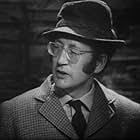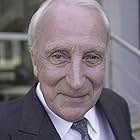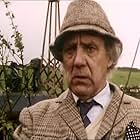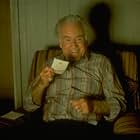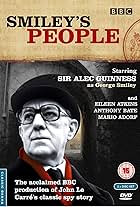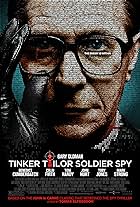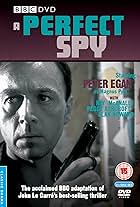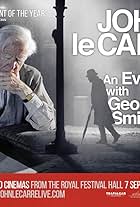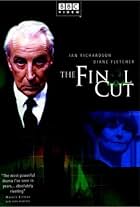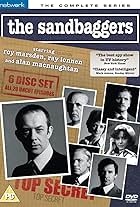In the bleak days of the Cold War, espionage veteran George Smiley is forced out of semi-retirement to uncover a Soviet agent within MI6's echelons.In the bleak days of the Cold War, espionage veteran George Smiley is forced out of semi-retirement to uncover a Soviet agent within MI6's echelons.In the bleak days of the Cold War, espionage veteran George Smiley is forced out of semi-retirement to uncover a Soviet agent within MI6's echelons.
- Nominated for 1 Primetime Emmy
- 4 wins & 8 nominations total
Browse episodes
Storyline
Did you know
- TriviaJohn le Carré was so impressed by Alec Guinness's performance as George Smiley that, in later novels, he wrote Smiley's characterization to be in keeping with Guinness' performance.
- Quotes
Roy Bland: It isn't ordinary flight information, Peter. The source is very private.
Toby Esterhase: Ultra, ultra sensitive in fact.
Peter Guillam: In that case, Toby, I'll try and keep my mouth ultra, ultra shut.
[Bill Haydon chuckles]
- Crazy creditsThe opening titles show a set of Russian matryoshka dolls. One doll opens up to reveal a doll more irate than the other one, and the final doll is seen as being faceless. This was inspired by a line at the end of the "Tinker, Tailor, Soldier, Spy" novel describing the mole: "Smiley settled on a picture of one of those little Russian dolls that open up to reveal one inside the other, and another inside him. Of all men living, only Karla had seen the last little doll inside..."
- Alternate versionsThe American DVD edition is a syndicated edit comprised of six episodes instead of seven.
- ConnectionsFeatured in The 33rd Annual Primetime Emmy Awards (1981)
- SoundtracksNunc Dimittis
Composed by Geoffrey Burgon
Sung by Paul Phoenix and the Boys of the St Paul's Cathedral Choir
Featured review
Definitely in the BBC pantheon (alongside I Claudius and Pride and Prejudice), partly for its formidable cast, but mainly for John Irvin's taut directorial grip - a model of visual economy and uncompromising narrative drive.
A double-agent or 'mole' is suspected at the top levels of the British secret service and retired spymaster Alec Guiness must narrow down the suspects amongst his former colleagues. Arthur Hopcraft's adaptation, while capturing the bureaucratic intrigue and perfidy of John Le Carre's novel, will demand viewers' utmost attention if they want to stay with the unfolding plot.
Irvin shoots Tinker, Tailor as if for widescreen - edge of the screen compositions, careful background detail - and demonstrates how a determined director can overcome the limitations of television(usually seen as a writer or producer's medium). Look at how he composes and cuts the scene where Guillam (Michael Jayston) is interrogated round the boardroom table towards the end of the first half. How Irvin provides deft little 'bookend' shots with the characters slowly walking away from camera.
Not that his sparse, pared-down style doesn't translate to action scenes with equal verve. The prologue - Ian Bannen's abortive mission into Czechoslovakia and its climatic chase through the forest - is as tense as anything you're likely to see on the big screen. Wintry settings and a fraught music score (mainly strings) add to this bleak, cynical vision.
Irvin landed the Hollywood actioner Dogs of War on the strength of Tinker, Tailor, but despite clever touches it didn't launch a notable cinema career. Look out, however, for his earlier television adaptation of Dickens' Hard Times. (For another example of very superior television direction, check out James Goldstone's handling of two first-season Star Trek episodes - 'Where No Man Has Gone Before' and 'What Are Little Made Of').
Author Le Carre may have topped Tinker,Tailor with a dazzling sequel (The Honourable Schoolboy, published 1977), but this is still far and away the best espionage suspenser ever televised. Indeed, it's hard to see how anything else, post Cold War, could quite match this relentless, ruthless dissection of personal and political betrayals.
A double-agent or 'mole' is suspected at the top levels of the British secret service and retired spymaster Alec Guiness must narrow down the suspects amongst his former colleagues. Arthur Hopcraft's adaptation, while capturing the bureaucratic intrigue and perfidy of John Le Carre's novel, will demand viewers' utmost attention if they want to stay with the unfolding plot.
Irvin shoots Tinker, Tailor as if for widescreen - edge of the screen compositions, careful background detail - and demonstrates how a determined director can overcome the limitations of television(usually seen as a writer or producer's medium). Look at how he composes and cuts the scene where Guillam (Michael Jayston) is interrogated round the boardroom table towards the end of the first half. How Irvin provides deft little 'bookend' shots with the characters slowly walking away from camera.
Not that his sparse, pared-down style doesn't translate to action scenes with equal verve. The prologue - Ian Bannen's abortive mission into Czechoslovakia and its climatic chase through the forest - is as tense as anything you're likely to see on the big screen. Wintry settings and a fraught music score (mainly strings) add to this bleak, cynical vision.
Irvin landed the Hollywood actioner Dogs of War on the strength of Tinker, Tailor, but despite clever touches it didn't launch a notable cinema career. Look out, however, for his earlier television adaptation of Dickens' Hard Times. (For another example of very superior television direction, check out James Goldstone's handling of two first-season Star Trek episodes - 'Where No Man Has Gone Before' and 'What Are Little Made Of').
Author Le Carre may have topped Tinker,Tailor with a dazzling sequel (The Honourable Schoolboy, published 1977), but this is still far and away the best espionage suspenser ever televised. Indeed, it's hard to see how anything else, post Cold War, could quite match this relentless, ruthless dissection of personal and political betrayals.
- How many seasons does Tinker Tailor Soldier Spy have?Powered by Alexa
Details
- Release date
- Country of origin
- Languages
- Also known as
- Tinker, Tailor, Soldier, Spy
- Filming locations
- Bywater Street, Chelsea, London, England, UK(Smiley's house)
- Production companies
- See more company credits at IMDbPro
Contribute to this page
Suggest an edit or add missing content




















